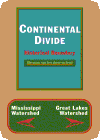

 |
|
|
|
|
|
|
|
 |
Other continental divide crossings had been developed elsewhere in the country. In upper New York State, a trench was dug to connect the Hudson River and Lake Erie. The Erie Canal provided a link between the Atlantic Ocean and the Great Lakes. Nearby, a short canal was completed in 1819 at the north end of the Hudson connecting to Lake Champlain, which drains into the St. Lawrence. This route allowed boat traffic from New York City to Quebec. In the South, a waterway was envisioned which would connect the Atlantic Ocean with the Ohio River system, over the Alleghenies. The route was to be from Chesapeake Bay along the Potomac River to its source, and then over the divide to the Ohio at Pittsburgh. Work was started in 182840 and the canal was completed as far as Cumberland, Maryland. Construction was halted in 1850, not because the canal was unfeasible, but because the Chesapeake and Ohio Railroad had been completed eight years earlier. In the unknown West, there was a dream of a water route, a northwest passage, to the Pacific Ocean. The dream lasted from the time of earliest exploration until finally the expedition of Lewis and Clark proved that the Rocky Mountains were a formidable barrier and a connection from the East to the West water systems would be neither easy nor short.